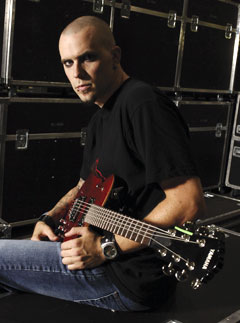


Most people aren't awake at 4:30am, let alone recording heavy metal tracks in their personal studios, but guitarist Dustin Tooker, and his band, Grade 8, believe in capturing ideas whenever inspiration strikes.
"IF WE WANT TO RECORD AT 4:30AM ON A TUESDAY, WE DO IT," SAYS TOOKER. "That's why it's great living here in Las Vegas. This city goes 24 hours a day. It's normal to be out all night and sleep during the day. When you call for a pizza in the middle of the night, it shows up."

Dustin and his brother, lead vocalist, Ryan, started Grade 8 in their native New Jersey before relocating to LA, where they recorded two successful CDs, Grade 8 and Resurrection. Now the band has resettled in Vegas, where they work tirelessly writing and arranging in advance of their still-untitled third release.
The mixes I get on the MSP10STUDIOS are amazing. It's a perfect reference.
Grade 8 decided early on to invest in their own studio. "We got tired of dealing with other studios and waiting on time," explains Dustin. "So we pieced together our own studio, partly with the help of Yamaha. It turned out to be a much more comfortable and productive situation, because we can work at our own pace."
And it's a fast pace. "Basically," says Dustin, "we never stop recording. It's pretty much all we do. We write and record faster than the records can come out."
Yamaha MSP10STUDIOS play a crucial role in Grade 8's recording process. "Good monitors are incredibly important," says Tooker. "If you can't hear back exactly what you're putting in, you'll never be able to mix anything. You don't want monitors that color the sound--you want them to translate what's really there. That's why I love Yamaha MSP10STUDIOS. They don't manipulate the sound--they just deliver what's really going on. They're almost the same speaker as the Yamaha NS10, which was the industry standard for a long time. But the MSP10STUDIOS are powered, so you don't need an external amp. That's great for saving space in a home studio. The mixes I get on the MSP10studios are amazing. It's a perfect reference."
Tooker balks at recommending Grade 8's DIY approach to everyone. "I don't tell all new artists that they ought to build a studio. You need to have some experience to get good results from any kind of gear. I know I wouldn't have been able to make quality recordings if I hadn't had the chance to work with great producers like Toby Wright. But for people with some experience, it can be a great option."
Having his own studio has also enabled Tooker to explore new approaches to his instrument. One player in particular has influenced Dustin's recent experiments: Led Zeppelin's Jimmy Page.
"I met him at a party," says Tooker. "It was a big thing for me. He was so gracious and cool, talking to me like a musician and not just another fan. He inspired me to go back and really listen to the amazing things he did in the studio, and that experience really changed the way I use guitars. For one thing, I've learned that less is more. A lot of young players think that the more gain and lowend they have, the heavier they'll sound. But often you have to design guitar tones to cut, as opposed to saturate. Sure, you feel the low-end if you turn it up, but you don't actually hear the part, because it doesn't cut through the mix. Sometimes you have to let the bass take the low-end and focus on making the guitars cut in the midrange."
As a result, Tooker has been working with less distorted sounds, or layering sharper, smaller tones atop thickly overdriven ones. "I've been tracking guitars through different filters and stacking them in different ways," he explains. "I use the Yamaha MagicStomp a lot for guitar overdubs, because it has a lot of great filtered sounds that translate the mids and upper-mids. That makes a huge difference in terms of how the parts stand out."
The goal, says Dustin, is to create guitar parts that drive the music melodically as well as rhythmically. "A lot of young bands just chunk away, caveman style. I was as guilty of that as anyone. But now I realize that all the great bands of the '70s had guitar-driven melodies, and I'm trying to capture some of that for the next record. People may be a little surprised by what they hear, but then they should expect a few surprises from us."
























